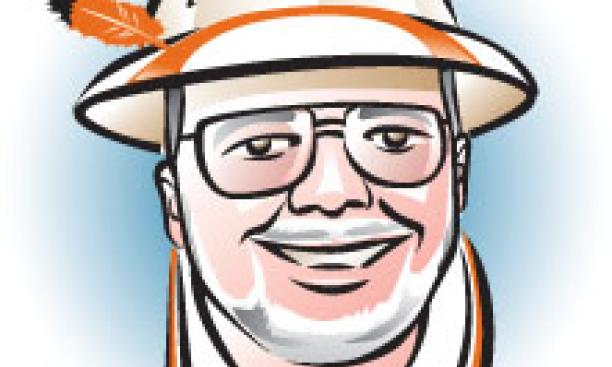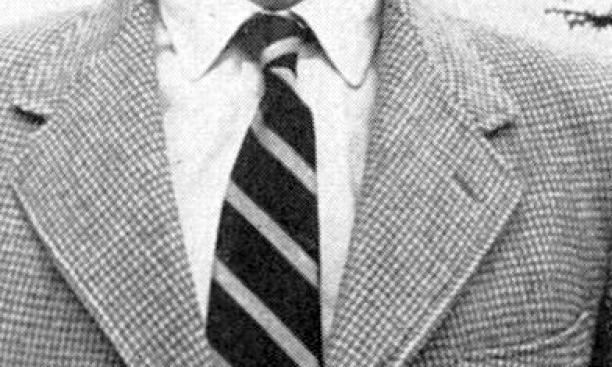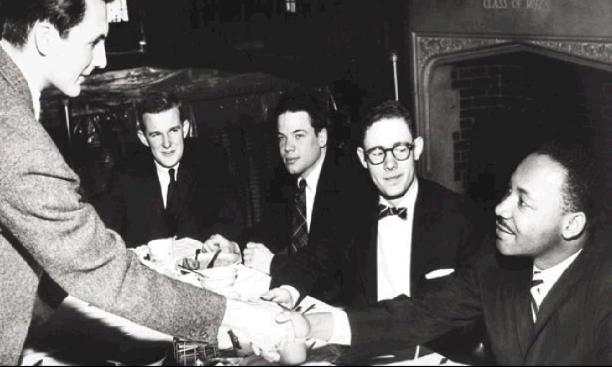



You meet the most interesting people in this job. And perhaps most intriguingly, many of them are dead. As a timely example, consider that if it weren’t for Martin Luther King Jr. and his first sermon in the Chapel 50 years ago, I never would have met the late Roland Frye ’43 *52 and Louis Werner ’61.
Perhaps, though, we should begin at the beginning with Rev. Ernest Gordon. Dean Ernie, as he was known everywhere on campus except to his face, came by his religion the old-fashioned way; he earned it. An agnostic Scots university man, he served as an Army captain in World War II and was captured by the Japanese. He endured the unimaginable torture of three-and-a-half years in the prison camp memorialized in both David Lean’s monumental Bridge on the River Kwai and the 2002 To End All Wars, based on Gordon’s autobiography. Emerging from this hell on earth, where he had started prayer and ethics groups among the prisoners, he studied for the ministry, eventually coming to Princeton as the Presbyterian chaplain in 1954. A year later, he was chosen third dean of the Chapel. Were you, the Ardent Historian, to suspect that a minister emerging from such a crucible would be uncowed by social nicety or convention, you would be correct. As the Faculty Song noted:
All hail to Gordon, Earnest [sic] Dean
Of Heaven and Hell he paints the scene.
If you can take his brimstone brew,
You’ll get your Scotch on Sunday too.
Dean Gordon, after observing dreadfully injured Japanese soldiers as well as his own comrades, felt that the enemy wasn’t the problem, that racial differences weren’t the problem, that Evil was the problem, and that Love was the answer. Even before he came to Princeton, he was corresponding with Rev. Dr. Martin Luther King Jr., who was convinced that Gandhi’s nonviolence held the key to airing grievances, small and large. In late 1958, a year following the successful Montgomery bus boycott, Gordon invited King to deliver a Sunday sermon in the Chapel.
The blustering, self-righteous notes and letters from the alumni streamed in. I could tell you what they said, but you know what they said, raising every specter from the Red Menace to the IRS. The majority of them came from the South. Most of them came to Bob Goheen ’40 *48, the new 38-year-old president, who was about to kick off the University’s first organized capital campaign. Goheen, also a decorated World War II Army veteran, patiently explained that the choice was the dean’s; that it was a sermon by an ordained minister, not a bus boycott; and that in any case the University was not in the business of censorship. Gordon, who ran his own show and was not in the habit of needless chatter, sent Goheen an extraordinary memo noting that “I have been greatly encouraged by your moral integrity and forthrightness.”
The whole topic was sidetracked, dramatically. King was knifed in New York by a delusional black woman; he required a lengthy convalescence and so the sermon didn’t happen. The rumors spread among the alumni clubs that the Alabama alumni had threatened the University and Goheen had capitulated. Gordon responded the next fall by re-inviting King for a Chapel sermon (along with the esteemed theologian Paul Tillich for emphasis) in March 1960 as part of a Student Christian Association conference. The letters of outrage started again, but the capital drive was now under way and Goheen’s stakes were much higher. The annual alumni conference for 1960 focusing on the campaign was scheduled for Atlanta. Rather than even suggest compromise over King, Goheen and the trustees moved the conference to Chicago, and pulled many of the faculty members who were promoting the campaign in the South off the trail to avoid open confrontation.
If it was possible for this plot to thicken, on Feb, 1, 1960, it did. Four North Carolina A&T students began a peaceful sit-in at the segregated Woolworth’s lunch counter in Greensboro. Sympathy sit-ins began, first in the South, then even in Cambridge and New Haven, where the Woolworths were fully integrated. At 1 p.m. on Saturday March 12, the day before King’s sermon, some Princeton students began picketing on Nassau Street outside the Princeton Woolworth’s. It was explicitly symbolic to support Greensboro; not only did they not attempt to impede anyone going in, but when they ran out of poster board for signs, they went into the store and bought some. Of course, this didn’t stop some other Princeton students heckling them; some of the town’s high-school-age denizens took the cue and tried to shove the marchers around. Borough police removed the kids, and the picketers continued unruffled until their scheduled 5 p.m. stop. There were no plans to repeat. The Woolworth’s manager noted to the press the value of and expressed sympathy with his “colored” customers.
The next day’s sermon was a Gandhi-esque exercise in restraint; Rev. King even noted that the Negro must not just be concerned with his own rights, but the brotherhood of all. Each of us, he said, must be concerned not just with the length of his life but its breadth and height, toward God; only in that personal enrichment was there real human value. It was reported that 3,500 people attended the service, although how they fit into the Chapel I can’t imagine. It certainly was far above the normal Sunday; only freshmen were still required to attend church services, and all they needed to do was to go anywhere in town once every other weekend. There was clearly demand for King’s message, regardless of the alumni foofaraw.
On March 23 the Student Christian Association sponsored a brief prayer service in the Chapel at noon hour to express “Christian concern over racial discrimination in the South and the North” with a freewill offering for Dr. King’s Southern Christian Leadership Conference (SCLC). Attending were 150 people, about one-third students, along with every chaplain on campus and Dean Gordon.
University community reactions to these events were confusing. The Daily Princetonian gave each a couple of columns on page one – most especially the Woolworth’s picketing – but editorially reacted guardedly, opposing the picketing as “antics” but supporting the prayer service and the donation to SCLC. The newspaper had no opinion about the sermon. A frequent op-ed columnist, my new friend the late Louis Werner, strongly supported the picketers in his response column, noting that “the meek may inherit the earth, but not in the near future.” Before April, the entire topic vanished from the Prince.
Meanwhile, Your Favorite Periodical chose to keep an even lower profile; the only PAW coverage (April 15, 1960) was by Donald Kramer ’60 in his On the Campus column, which fastidiously documented the events. Aside from a couple of to-be-expected letters to the editor later on, that was it. Even Dean Gordon, in a two-page spread in PAW later in the spring, chose to write solely about undergraduates and religion, with no mention of human or civil rights of any sort, much less King’s sermon.
Which makes my other new buddy, Professor Roland Frye, all the more impressive. He grew up in Alabama, got all three of his degrees at Princeton, and in 1958 was teaching at Emory University in Atlanta, which was legally segregated by Georgia law. But like Dean Gordon and President Goheen, he was a decorated war veteran, in his case of the Battle of the Bulge, and while the epithets poured in from across the South he instead wrote Goheen in support of the sermon invitation to the pastor of Montgomery’s Dexter Avenue Baptist Church, whom he considered to be a prophet. “There are many who would object to inviting Isaiah (if he were available) into a modern pulpit,” mused Frye. He went on to become a renowned Shakespeare and Milton scholar, Penn’s Schelling professor of English Literature, honoree of the American Philosophical Society and co-founder of the Center of Theological Inquiry in Princeton, which hardly surprised Goheen, I would suspect.
But in 1958, Frye was simply a rational voice calling from the wilderness encouraging the president to keep the faith so painfully realized by Capt. Ernest Gordon in the jungles of Burma. The sermon that honored Gandhi may have been Dr. King’s, but his officiants Gordon, Goheen, and Frye made their faith known equally well. Dei sub numine viget.
